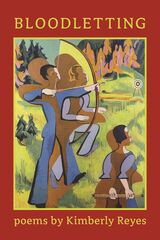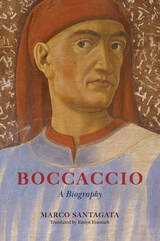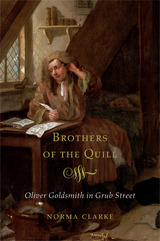
Oliver Goldsmith arrived in England in 1756 a penniless Irishman. He toiled for years in the anonymity of Grub Street—already a synonym for impoverished hack writers—before he became one of literary London’s most celebrated authors. Norma Clarke tells the extraordinary story of this destitute scribbler turned gentleman of letters as it unfolds in the early days of commercial publishing, when writers’ livelihoods came to depend on the reading public, not aristocratic patrons. Clarke examines a network of writers radiating outward from Goldsmith: the famous and celebrated authors of Dr. Johnson’s “Club” and those far less fortunate “brothers of the quill” trapped in Grub Street.
Clarke emphasizes Goldsmith’s sense of himself as an Irishman, showing that many of his early literary acquaintances were Irish émigrés: Samuel Derrick, John Pilkington, Paul Hiffernan, and Edward Purdon. These writers tutored Goldsmith in the ways of Grub Street, and their influence on his development has not previously been explored. Also Irish was the patron he acquired after 1764, Robert Nugent, Lord Clare. Clarke places Goldsmith in the tradition of Anglo-Irish satirists beginning with Jonathan Swift. He transmuted troubling truths about the British Empire into forms of fable and nostalgia whose undertow of Irish indignation remains perceptible, if just barely, beneath an equanimous English surface.
To read Brothers of the Quill is to be taken by the hand into the darker corners of eighteenth-century Grub Street, and to laugh and cry at the absurdities of the writing life.
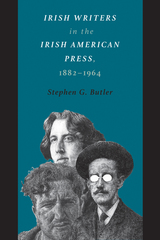
Irish Writers in the Irish American Press spans the period from Oscar Wilde's 1882 American lecture tour to the months following JFK's assassination and covers the century in which Irish American identity was shaped by immigration, religion, politics, and economic advancement. Through a close engagement with Irish American periodicals, Butler offers a more nuanced understanding of the connections between Irish literary studies and Irish American culture during this period.
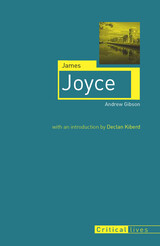
Andrew Gibson argues here that the most important elements in Joyce’s novels are historically material and specific to Ireland—not, as is assumed, broadly modernist. Taking Joyce “local,” Gibson highlights the historical and political traditions within Joyce’s family and upbringing and then makes the case that Ireland must play a primary role in the study of Joyce. The fall of Charles Stewart Parnell, the collapse of political hope after the Irish nationalist upheavals, the early twentieth-century shift by Irish public activists from political to cultural concerns—all are crucial to Joyce’s literary evolution. Even the author’s move to mainland Europe, asserts Gibson, was actually the continuation of a centuries-old Irish legacy of emigration rather than an abandonment of his native land.
In the thousands, perhaps millions, of words written about Joyce, Ireland often takes a back seat to his formal experimentalism and the modernist project as a whole. Yet here Gibson challenges this conventional portrait of Joyce, demonstrating that the tightest focus—Joyce as an Irishman—yields the clearest picture.
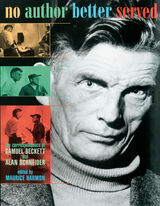
For Alan Schneider, directing Endgame, Samuel Beckett lays out the play’s philosophy, then adds: “Don’t mention any of this to your actors!”
He claimed he couldn’t talk about his work, but Beckett proves remarkably forthcoming in these pages, which document the thirty-year working relationship between the playwright and his principal producer in the United States. The correspondence between Beckett and Schneider offers an unparalleled picture of the art and craft of theater in the hands of two masters. It is also an endlessly enlightening look into the playwright’s ideas and methods, his remarks a virtual crib sheet for his brilliant, eccentric plays.
Alan Schneider premiered five of Beckett’s plays in the United States, including Waiting for Godot, Krapp’s Last Tape, and Endgame, and directed a number of revivals. Preparing for each new production, the two wrote extensive letters—about intended tone, conception of characters, irony and verbal echoes, staging details for scenes, delivery of individual lines. From such details a remarkable sense of the playwright’s vision emerges, as well as a feel for the director’s task. Of Godot, Beckett wrote to Schneider, “I feel my monster is in safe keeping.” His confidence in the director, and Schneider’s persistent probing for a surer understanding of each play, have produced a marvelous resource: a detailed map of Beckett’s work in conception and in production.
The correspondence starts in December 1955, shortly after their first meeting, and continues to Schneider’s accidental death in March 1984 (when crossing a street to mail a letter to Beckett). The 500 letters capture the world of theater as well as the personalities of their authors. Maurice Harmon’s thorough notes provide a helpful guide to people and events mentioned throughout.
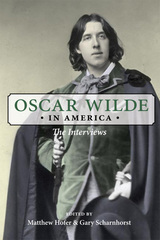
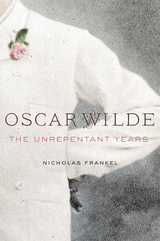
Nicholas Frankel presents a new and revisionary account of Wilde’s final years, spent in poverty and exile on the European continent following his release from an English prison for the crime of “gross indecency” between men. Oscar Wilde: The Unrepentant Years challenges the prevailing, traditional view of Wilde as a broken, tragic figure, a martyr to Victorian sexual morality, and shows instead that he pursued his post-prison life with passion, enjoying new liberties while trying to resurrect his literary career.
After two bitter years of solitary confinement, Frankel shows, Wilde emerged from prison in 1897 determined to rebuild his life along lines that were continuous with the path he had followed before his conviction, unapologetic and even defiant about the crime for which he had been convicted. England had already done its worst. In Europe’s more tolerant atmosphere, he could begin to live openly and without hypocrisy.
Frankel overturns previous misunderstandings of Wilde’s relationship with Lord Alfred Douglas, the great love of his life, with whom he hoped to live permanently in Naples, following their secret and ill-fated elopement there. He describes how and why the two men were forced apart, as well as Wilde’s subsequent relations with a series of young men. Oscar Wilde pays close attention to Wilde’s final two important works, De Profundis and The Ballad of Reading Gaol, while detailing his nearly three-year residence in Paris. There, despite repeated setbacks and open hostility, Wilde attempted to rebuild himself as a man—and a man of letters.


A noted scholar considers here a broad range of English autobiographical writing since 1800. Jerome Hamilton Buckley discusses not only autobiographies proper but also novels and poems animated by the subjective impulse. Drawing from time to time on American and Continental European writers, he focuses on British autobiographers, especially those, like Wordsworth, concerned with a larger psychological or spiritual dimension to their personal experience. With economy and grace, he examines the work of Darwin, Ruskin, Mill, Newman, C. S. Lewis, Bertrand Russell, and Edwin Muir. He discusses also the roleplaying and self-creation of Oscar Wilde, George Moore, Edmund Gosse, and Henry Adams. Variations in the autobiographical novel are described, with special attention to Dickens, George Eliot, Lawrence, and Joyce. Buckley concludes by exploring the differences between the principal Victorian poets and the confessional poets of today in their attitudes toward subjectivity.
Buckley reaffirms traditional notions—that the self exists and persists through its vicissitudes, that autobiography, for the most part, reflects or represents a pre-existing self rather than creating it, and that the self is rooted in history and in the objective social and physical world. No other book has attempted to place autobiography in a similar perspective, and none combines analysis of specific autobiographies with a regard for the function of subjectivity and a concern for its cultural consequences.
READERS
Browse our collection.
PUBLISHERS
See BiblioVault's publisher services.
STUDENT SERVICES
Files for college accessibility offices.
UChicago Accessibility Resources
home | accessibility | search | about | contact us
BiblioVault ® 2001 - 2025
The University of Chicago Press



